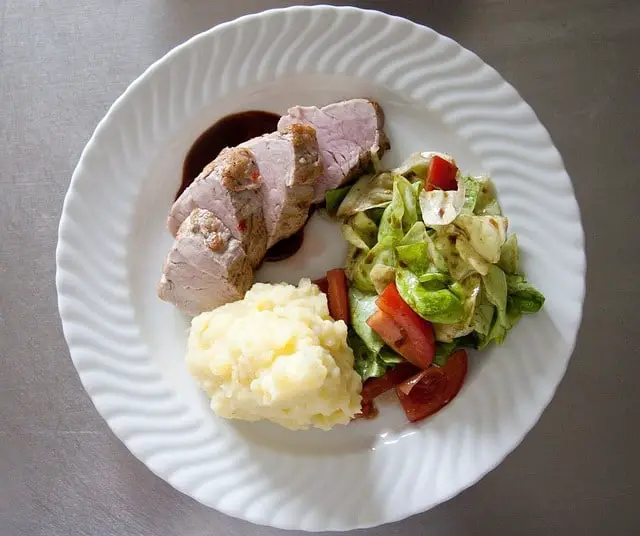Mashed potatoes can be a very tricky dish to nail, with all sorts of problems arising here and there during preparation.
Some of the most common problems include “the gummy mashed potatoes” which is typically the result of over mashing the boiled potatoes, “the watery mashed potatoes” which occurs when too much liquid is incorporated into the mash, and “the stiffened or hardened mashed potatoes” which is caused by… exactly what we’re going to be discussing in this article.

Here’s why mashed potatoes get hard or stiff
Mashed potatoes get hard or stiff when left to sit for some time (at room or refrigeration temperature) because of a phenomenon known as starch retrogradation.
Starch retrogradation occurs when the starch molecules in a potato reverse or retrograde into a more crystalline form when cooled, expelling water and causing stiffness.
Because potatoes are full of starch, cooking them results in the gelatinization of the starch (separation of the starch molecules by water) which cause the food to become soft and increase in bulk.
When the potatoes are mashed hot, then allow to cool for some time, the molecules instantly begin to push the water (bonding with them) out and reform their original bonds, leading to a stiffer end product.
If you’re finding it difficult to understand the concept of starch retrogradation, then the few examples below might give you an insight.
Ever noticed when a bread turns hard after baking and leaving it to sit for a while?
It’s because the gelatinized starch having an amorphous structure begins to retrograde, i.e form back into the crystalline structure it was during the dough stage.
This causes the bread to turn hard. This is also the same thing you see in long grain rice when you cook and allow them to cool on the counter or in the refrigerator.
When it comes to mash potatoes, the stiffening effect of starch retrogradation isn’t really felt that much because of the fat content added which naturally works against hardening.
You didn’t add enough liquid
Let’s forget the starch retrogradation thing for a sec, if you plain out made mashed potatoes and found out they were too hard, the culprit is likely different here. It’s mostly the fact that you used too many potatoes or cut back on the amount of liquid you’re supposed to add.
It could also be because you over worked the mashed potatoes which makes them stiffer.
How to make mashed potatoes softer again
So you already have a problem at hand which is a mashed potato that is hard. so how do you make it softer?
Whether you have a mashed potato that is hard from starch retrogradation or from adding too much mashed potatoes, the one thing that you need to do in order to salvage the mash potatoes is to add more liquid to it.
Adding more liquid adds more moisture and therefore with stirring, allows the molecules to gelatinize back or adopt an amorphous state and the mashed potatoes to gain its softness.
When it comes to adding liquid also, it is best to opt for liquids that have a bit of bulk to them like cream or milk, as these would help maintain the thickness of the mashed potatoes as opposed to water which thins out potatoes really bad and can lead to a mushy mashed potato. Plus it doesn’t bring any flavor to the table.
Also when you’re adding the liquid, make sure to add a little at a time (heated) until you arrive at the desired consistency.
If by mistake you end up adding too much liquid, you can salvage the situation and gain back the thickness by adding fresh boiled and mashed potatoes to the watery potatoes, or by adding potato flakes if you have one in the cupboard. Make sure to add potato flakes one tablespoon at a time so you don’t end up with a mashed potato that is too thick.
When you are done playing around with the consistency of the mashed potato, make sure to remember to season before you plate.
Why is my mashed potatoes too soft?
On the other hand, you can have mashed potatoes that are too soft, and the likely culprit is the addition of too much water.
How you can make the mashed potatoes harder again is using the technique we mentioned above, add more boiled mashed potatoes to the mix (make sure they are unsalted) or use potato flakes one tablespoon at a time.
Some people swear by adding bulking agents such as cornstarch and flour, but you have to make sure you’re baking the potatoes so the flour cooks through before you can serve.
Another way mashed potatoes end up way too soft is from the potatoes themselves.
When you cut them into small cubes and boil them for a long time, they end up soaking up more water into the core which causes any mashed potatoes made with them to become waterlogged.
Large cuts on the other hand do not absorb as much water and as a result will not produce waterlogged mashed potatoes.
Why is my mashed potato gluey?
Another problem you can also run into when making mashed potatoes is gluey mashed potato. And this time around, the culprit is over mashing. You can over mash potatoes in the blender and food processor (almost always), and even by hand or using an electric mixer.
Mashed potatoes are just done when they have that fluffy and spread out consistency, but of course different people like their mashed potatoes differently, and if gluey mashed potatoes is your thing, don’t hesitate to throw the potatoes in the blends with so much milk and grind the soul out of them.
You can read more on gummy mashed potatoes in a previous article that we wrote.

